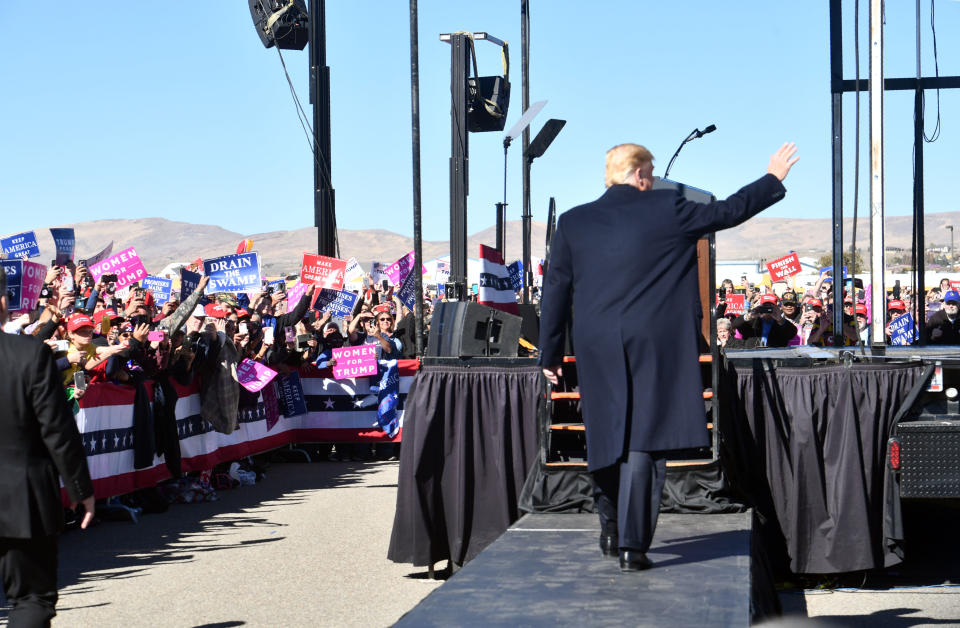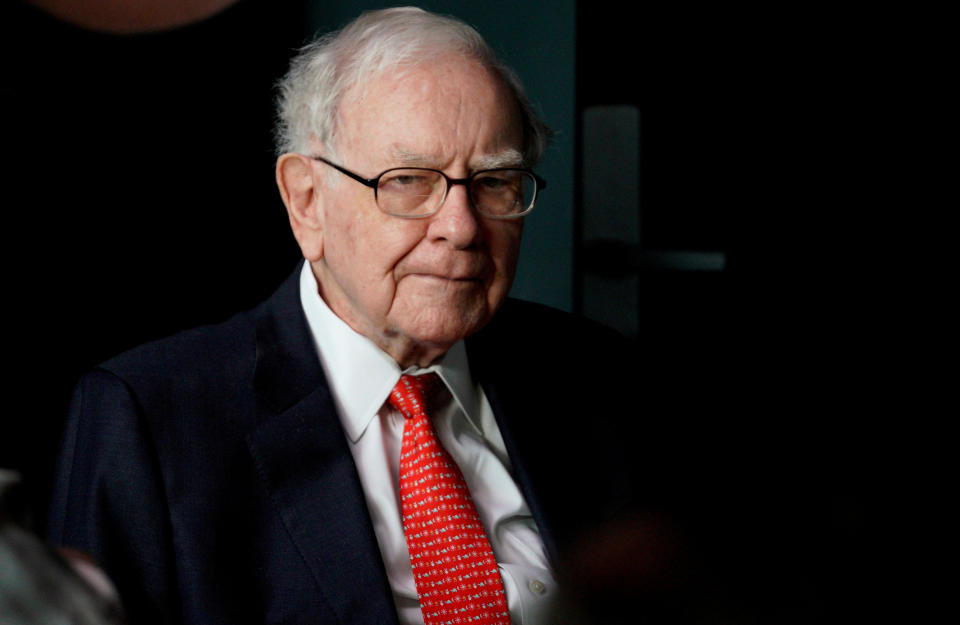MIDTERMS — What you need to know for the week ahead in markets
Stocks finished a busy week for investors on a down note.
On Friday, each of the major indexes closed in the red with tech stocks leading the way lower as shares of Apple (AAPL) dropped over 6% following earnings that disappointed.
Markets were also knocked around on Friday by trade news, with overnight reports from Bloomberg indicating that the White House was working on the draft of a possible trade deal before Trump’s chief economic advisor Larry Kudlow and the President himself sent investors conflicting messages about trade during the afternoon.
And all of this leaves out the stellar October jobs report which showed hiring topped estimates, wages grew by the fastest pace in nine years, and the unemployment rate held at its lowest level since 1969.
Bank of America Merrill Lynch said Friday that this was a “strong jobs report across the board.” Michael Feroli, an economist JP Morgan, said Friday that “the red-hot labor market shows no signs of cooling.”
Feroli adds, “All in all it’s quite hard to find anything to complain about in this report (except for the productivity implications, but that’s a story for another day). There are no immediate GDP implications, though the tone of the report is clearly consistent with above-trend growth in Q4. The Fed implications are obvious: they remain well on track to hike in December, and we continue to believe they will deliver several more increases next year.”
In the week ahead, investors will hear from the Federal Reserve on Thursday when the central bank announces its latest policy decision, which is expected to see its benchmark interest rate target range hold steady at 2%-2.25%.
There will also be no press conference with Fed chair Jay Powell following this meeting, the last meeting without a scheduled post-statement press conference for the foreseeable future as the Fed will move to hold a briefing after all eight of its annual meetings beginning in January.
The main event this coming week will come from the political arena with Election Day on Tuesday.
Most recent polling suggests the Democrats will take control of the House of Representatives while Republicans are likely to retain the Senate, though as we noted in mid-October the market is bracing for a post-election reaction that is more akin to a presidential election than a midterm election.
“If one party controls each house, the gridlock and partisanship will not change one iota,” said Greg Valliere, chief global strategist at Horizon Investments. “Incredibly, the 2020 election will begin once the polls close next Tuesday, and Trump may get a foil as Democrats overplay their hand and weigh impeachment after Robert Mueller releases his report.”

Either way, this week is one where the mythical market concern of “political risk” will be front and center, no matter which way Tuesday goes.
And corporate earnings season, while somewhat winding down, will still stay busy with over 75 members of the S&P 500 set to report results, including Marriott (MAR), Booking Holdings (BKNG), Eli Lilly (LLY), TripAdvisor (TRIP), Dish Networks (DISH), Humana (HUM), Wynn Resorts (WYNN), Twenty-First Century Fox (FOXA), Cardinal Health (CAH), Discovery Networks (DISCA), and Disney (DIS).
Economic calendar
Monday: Markit services PMI, October (54.7 expected; 54.7 previously); ISM non-manufacturing activity, October (59 expected; 61.6 previously)
Tuesday: Job openings and labor turnover survey, September (7.125 million open jobs expected; 7.136 million jobs open previously); Midterm elections
Wednesday: Consumer credit balances, September (+$15 billion expected; +20.1 billion previously)
Thursday: Initial jobless claims (215,000 expected; 214,000 previously); Federal Reserve interest rate decision (2%-2.25% expected; 2%-2.25% previously)
Friday: Producer prices, October (+0.3% expected; +0.2% previously); Wholesale inventories, September (+0.3% expected; +0.3% previously); University of Michigan consumer sentiment, November (97.9 expected; 98.6 previously)
Buffett’s buyback
In July, we knew it was coming.
And now it is here — Warren Buffett is buying back big chunks of Berkshire Hathaway (BRK-A, BRK-B) stock.
On Saturday, the company published its latest quarterly report with the SEC, disclosing that during the third quarter Berkshire repurchased $928 million worth of its own stock.
“Berkshire has a common stock repurchase program which, as amended on July 17, 2018, permits Berkshire to repurchase its Class A and Class B shares at prices below Berkshire’s intrinsic value, as conservatively determined by Warren Buffett, Berkshire’s Chairman of the Board and Chief Executive Officer, and Charlie Munger, a Vice-Chairman of the Board,” the company said in its latest filing.
“The program allows share repurchases in the open market or through privately negotiated transactions and does not specify a maximum number of shares to be repurchased. The program is expected to continue indefinitely. We will not repurchase our stock if it reduces the total amount of Berkshire’s consolidated cash, cash equivalents and U.S. Treasury Bills holdings below $20 billion. Financial strength and redundant liquidity will always be of paramount importance at Berkshire. In the third quarter of 2018, Berkshire paid $928 million to repurchase shares of Class A and B common stock under the program.”

Now, again, that Buffett was repurchasing Berkshire shares in the third quarter should not come as a surprise — the repurchase agreement was amended for a reason. Additionally, one expects that amid recent volatility that has sent Berkshire shares down about 6% over the last month, Buffett will continue to exercise his ability to buyback Berkshire stock.
But as was outlined back in the summer, Buffett’s ability to funnel some of Berkshire’s cash pile back into shares of the company says more about the rest of the investable universe than it does about Berkshire. In his most recent letter to Berkshire shareholders, Buffett noted that the company’s holding of $116 billion in cash and equivalent securities provided the company an “extraordinary” level of liquidity that is “far beyond the level Charlie and I wish Berkshire to have.”
Buffett added that, “Our smiles will broaden when we have redeployed Berkshire’s excess funds into more productive assets.”
Since then, Berkshire has continued to load up on shares of Apple — Berkshire owned about 5% of Apple as of the end of the second quarter — but not done much else. It seems that one of the most productive assets Buffett can find is to eat more of his own cooking.
And while there are always “fantasy football”-style deals out there for investors to contemplate on behalf of Berkshire Hathaway — should Berkshire buy Lowe’s, or GE, or an airline, and so on — it has now been over three years since the company’s last major deal (its $37 billion purchase of Precision Castparts in August 2015). The message from Omaha is clear — we don’t really love anything right now.
In 2018, stocks have twice seen significant bouts of volatility. The exact cause of these events has differed. But in both the February and October periods of market stress, many investors cited rising interest rates as a reason to express caution about the stock market, even as corporate earnings improved by more than 20% annually.
Perhaps, then, it is rising rates that are keeping Buffett on the sidelines.
“Everything in valuation gets back to interest rates,” Buffett told Yahoo Finance’s Andy Serwer in 2017.
And as Yahoo Finance’s Sam Ro detailed last year, Buffett has on many occasions discussed his use of interest rates as the main way to gauge the attractiveness of any investment. (Something, of course, almost any money manager also does.) Laid out most simply, rising interest rates increase the return one requires from any investment because the risk-free rate that can be earned on short-term investments like Treasury bills increases.
If you assume Berkshire’s cash pile yields about the same as a 3-month Treasury bill, the return on doing nothing for Buffett has gone from around 0.1% in August 2015 when the Precision Castparts deal was announced to 2.3% today.
And while we consistently hear investors calling out strong U.S. economic growth and strong corporate earnings as catalysts for why stocks should trade higher, if Buffett is being held back from making big bets because of higher interest rates he’s surely not the only one.
—
Myles Udland is a writer at Yahoo Finance. Follow him on Twitter @MylesUdland

 Yahoo Finance
Yahoo Finance 
